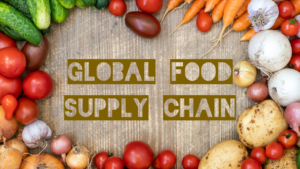This week’s Economist magazine discusses the collapse of the Doha round of trade talks that started after the system perturbation of 11 September 2001 [“The Future of Globalization,” 27 July 2006]. The magazine, sarcastically, asserts that a “development round”, [was] seen as a clever way of giving grubby trade some moral appeal.” Begun as they were in the midst of turmoil, it’s not surprising that the collapse of the Doha round of talks went mostly unnoticed amid the instability currently grabbing the headlines. The article asserts that one reason less attention is being paid to this development than should be is that many pundits believe globalization is a juggernaut that can’t be stopped:
After all globalization is unstoppable: so what if a few technocrats in Switzerland packed up their briefcases and went home. So a lot. Such attitudes were behind the wrecking of the Doha round of trade talks this week. This disaster, born of complacency and neglect, signals a defeat of the common good by special-interest politics. If the wreck is terminal — and, after a five-year stalemate, that seems likely — everyone will be the poorer, perhaps gravely so.
The “special interest” in this case is primarily agriculture. Developing states want tariffs removed from agricultural products imported into developing nations, while farmers in developing states fear that an influx of cheap agricultural products from abroad will ruin the market for domestic products. Emotions always run high whenever domestic food production is discussed. History is filled with tales of famine and death and that specter haunts the collective conscience of most nations. The Economist, however, believes a diminishing commitment to global trade is also at fault.
“It is not just the narrow business of the Doha round (if narrow is a fit adjective for an ambition to lift millions out of poverty, curb rich countries’ ruinous farm support and open markets for countless goods and services) that is at stake. In the long run, the lack of commitment to multilateral trade that sank the Doha round this week will also start to corrode the trading system as a whole.”
To me, the collapse of the Doha round of trade talks demonstrates that the international system is not as resilient as it could or should be. It also indicates the abject failure of leadership by developed nations in putting forth a vision and paradigm to lift the less developed nations into a position where they can be fully integrated nations sharing in the benefits of globalization [I will speak more on this topic tomorrow.] These failures demonstrate the need for a new paradigm — my partner Tom Barnett and I, as I have noted on several occasions, have put forth such a new vision for post-conflict, post-failed states and failing states that we call Development-in-a-Box™. The aim of Development-in-a-Box is to help reduce the economic gaps between developed and developing states by helping bring developing states up to minimum standards in core infrastructure platforms (such as food and agriculture, utilities, financial services, telecommunications, etc.) so that they can attract foreign direct investment and hop on the globalization bandwagon and share in its benefits. Agricultural interests in developed states are rightly concerned about predatory pricing by unscrupulous agricultural businesses bent on exploiting the poor in order to make profits from the rich. No one wins in that scenario. A successful implementation of the Development-in-a-Box approach, however, means that as standards improve (including standards of living) in developing countries, the economic gaps that beg to be exploited are narrowed. As the Economist notes:
“The benefits from free trade come more from imports than from exports. Imports of cheaper or better goods give consumers more for their money and, through competition, raise domestic productivity.”
The Doha round indicates how difficult such one-size-fits-all negotiations are to conclude. The Economist avers that there is plenty of blame to go around, but I’m not much interested in playing the blame game. I’m more interested in promoting an approach that works around politics. Often economics races ahead of politics and, when it comes to development, this is likely to remain true. I’m in constant contact with people who possess both the desire and the will to help make things better. These people are found in international and non-governmental organizations as well as in the commercial sector. Working together, in the flexible framework encompassed in Development-in-a-Box, these groups will eventually — through deeds, market dynamics, and success — convince politicians to join the program.
The Economist laments the fact that because regional and bilateral agreements are easier to negotiate, but they are crowding out imperatives to negotiate on an international basis. Those negotiating such agreements, however, are forgetting that one of the peace dividends of the end of the cold war was the hope that the global economy could begin to operate by a single set of rules. Regional and bilateral agreements may be easier to negotiate, but they risk fracturing the global economy in new ways. The article notes that global economy is still fragile enough to be disrupted.
As noted above, the Economist believes that the collapse of the Doha round is disastrous. They recognize that “old hands” at trade talks will consider their judgment alarmist, but they recommend that old hands take a new look at how events are unfolding. The article asserts that this turn of events is “the biggest threat yet to the post-war trading system. It marked the trade diplomats’ surrender to the confidence trick on which the system is founded. And it betrayed a reckless disregard for the value not just of the Doha round, but also also of the smooth working of world trade.” The article indicates that the secret to the World Trade Organization’s success (its “confidence trick”) has been the organization’s “same-rules-for-all” principle that has been used since it was established.
“Multilateral liberalisation is a sort of jujitsu that uses exporters’ determination to get into foreign markets to overwhelm domestic lobbies that would sooner keep home markets closed. The trade diplomat’s incantation that to open his market is a “concession” granted in exchange for an opening somewhere else is economic nonsense spouted for domestic political purposes. But it is remarkably fruitful nonsense because, within the World Trade Organisation, any concession to one trade partner is automatically extended to all members. This trick has helped the world enjoy decades of prosperity.
“Is Doha’s collapse just a failure to advance, rather than a reversal? Probably not. True, the seas of world trade are calm. Trade has been growing much faster than global GDP. High commodity prices and robust growth mean that the call for protection is low. But although the system will not fall apart overnight, with the years, the rust will set in. Next year, the American president will lose the power that Congress has granted him to negotiate trade deals without them being picked to pieces by the legislature. That will make it hard to revive Doha. Rows about farm trade could be aggravated by next year’s American farm bill. The ill will evident this week could spread if American and European manufacturers start to shed lots of jobs in a downturn. Western complaints about the piracy of intellectual property could sharpen rows with developing countries. What’s more, the WTO’s crucial trade-disputes procedure could easily come unstuck.”
The article concludes: “They failed.” We simply can’t sit back and let “they failed” be the final word when it comes to making the world a better place in which to live. Does anybody really believe that food security is improved by crippling either foreign or domestic food production? We need to proffer a new paradigm that allows developing nations to use enlightened self interest to put in place systems to help less developed countries become – as my partner Tom Barnett likes to say – Low Cost Countries. Development-in-a Box is such a new paradigm. We cannot allow extreme shortsightedness to halt globalization’s advance. It has managed, to date, to help bring billions out of poverty, but there are billions to go.



